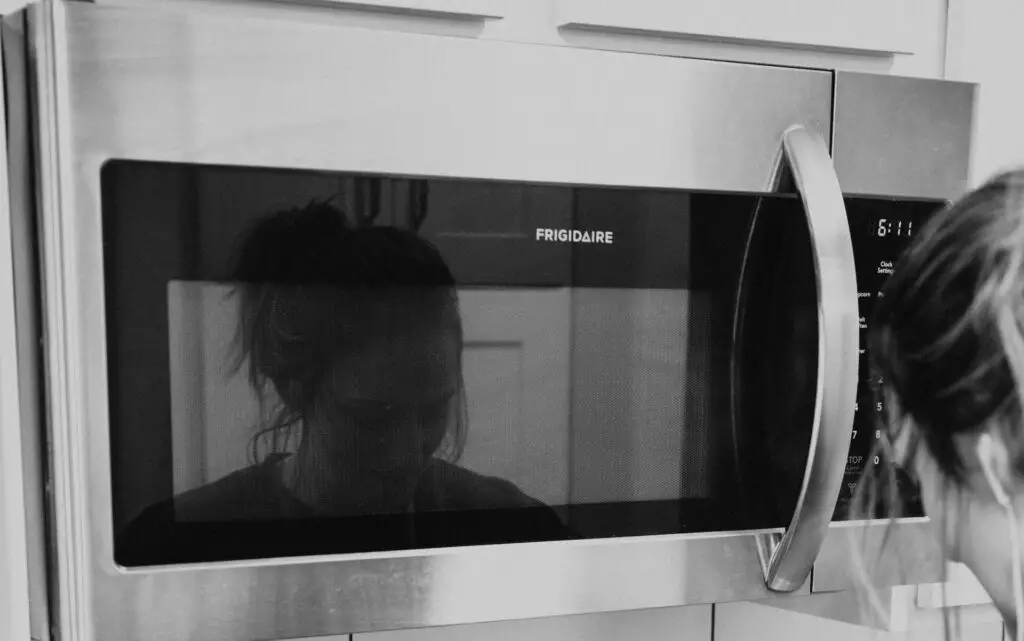Microwaves have become indispensable in our kitchens, making reheating and cooking more convenient than ever. However, many of us have experienced that peculiar moment when the microwave emits a buzzing sound, triggering safety concerns.
In this article, we’ll delve into the science behind microwaves, explore the reasons for buzzing sounds, and address the crucial question: Is a buzzing microwave dangerous?
So, Let’s start.
Table of Contents
How Does Microwave Work:

Within the heart of your microwave lies a small yet powerful wizard known as the magnetron. This unassuming device is the mastermind behind the magic of microwave cooking. Picture it as the conductor of an invisible orchestra, orchestrating a symphony of microwaves.
The magnetron springs into action as you hit the buttons on your microwave and set the timer. It generates microwaves, which are a type of electromagnetic radiation. But don’t let the term “radiation” intimidate you; these microwaves are perfectly safe for your food and you.
Once unleashed, these microwaves bounce off the metallic walls inside the oven, akin to a game of culinary ping pong. But the real star of the show is the water molecules nestled within the food you’re about to savour. These microwaves have a particular fondness for water molecules, causing them to tremble and shake excitedly.
Now, here’s where the kitchen magic happens. A curious thing occurs as the microwaves coax the water molecules into a lively dance. The molecules start rubbing against each other, generating friction-induced heat. It’s like a molecular party where the guests, in this case, the water molecules, are getting a little too cosy.
This molecular commotion heats your food, transforming it from a cold leftover to a piping hot delight. The microwave’s mission is accomplished – making your meals warm and ready to be enjoyed.
So, the next time you press those buttons and witness the hum of your microwave at work, remember the unsung hero, the magnetron, and its trusty sidekick, the mighty microwaves, turning your culinary dreams into reality, one reheated dish at a time.
Is A Buzzing Microwave Dangerous?

Yes, a buzzing microwave can indeed pose potential dangers. When you notice a high-pitched squeal or a loud hum emanating from your microwave, it’s like the appliance is trying to communicate with you, signalling a potential issue with its internal components, such as the magnetron or diode. These components are the powerhouse behind the microwave’s ability to generate the essential microwaves for cooking.
Similarly, if you detect a rattling or buzzing sound from the rear of the microwave, it’s often a red flag indicating trouble with the cooling fan. This fan plays a crucial role in maintaining the optimal temperature inside the microwave. When it malfunctions, it might affect the appliance’s performance and pose safety concerns.
However, it’s crucial to approach the idea of repairing a buzzing microwave with caution. Microwaves operate on a high voltage and have intricate electrical components that demand expertise to handle safely. Before attempting any repairs, it’s essential to recognize that the seemingly harmless act of fixing your microwave can expose you to potential hazards.
The buzzing is not just an annoying sound; it could be a warning signal. If you suspect an issue with your microwave, it’s advisable to consult a professional technician rather than risking your safety by delving into a potentially hazardous DIY repair. Remember, your well-being is paramount, and ensuring a safe environment in the kitchen is far more critical than silencing the buzzing within your microwave.
Why Does Your Microwave Make A Buzzing Noise?

A buzzing noise from your microwave can be disconcerting, signalling potential issues with internal components. While microwaves are known for their usual hum, a sudden change in the sound, such as a louder buzzing, warrants attention. It could indicate a malfunctioning cooling fan unit or other broken parts. To ensure your microwave continues to function smoothly, it’s crucial to identify and address the source of the buzzing.
1. Drive Motor
The drive motor powers the rotating turntable, and a malfunction can result in an unusual buzzing sound from the oven’s bottom. Access the unit from the bottom, examine the motor for damage, and use an ammeter to check continuity. Observing black or brown powder indicates burnt motor components, necessitating a replacement to eliminate the buzzing noise.
2. Magnetron
While microwave magnetrons are inherently noisy, a loud groaning may signal a problem. The magnetron, responsible for generating electromagnetic heat, could malfunction, either discharging higher power than average or struggling to generate heat. In such cases, it is advisable to replace the damaged magnetron with the help of a professional.
3. Cooling Fan
Microwaves incorporate fans to cool down the magnetron and other internal components that may heat up during operation. A malfunctioning cooling fan can result in a grinding noise, potentially leading to overheating or permanent damage. If your microwave emits a buzzing sound, inspect the cooling fan unit. Ensure your safety by disconnecting the power before removing the cover to examine the fan assembly for wear and tear. Clear any debris obstructing the blades and replace the fan if necessary.
4. Coupler
The drive coupler, responsible for rotating the glass tray, maybe the culprit if your microwave is buzzing loudly. Remove the tray and check for any damage to the coupler or roller guide, as these components could be causing the noise. A damaged coupler can lead to spillage and damage to the magnetron, making it essential to replace it promptly.
5. Diode
Adjacent to the magnetron, the high-voltage diode supplies DC power for electromagnetic power generation. If a loud groan is heard, it may be challenging to distinguish whether it originates from the diode or magnetron. Use a multimeter to test continuity, but exercise caution due to the high voltage. Seek professional assistance to inspect and replace damaged components.
6. Roller Guide
A broken roller guide can grind on the bottom of the microwave, causing a buzzing sound. Disconnect the unit from power, remove food, and inspect the roller guide. If the rollers are broken or worn out, replace the guide to prevent damage to the microwave cavity, rust, and sparking.
By addressing these potential issues, you can ensure your microwave operates smoothly and efficiently. Refer to the table below for assistance in distinguishing various microwave sounds.
How Can You Fix A Buzzing Microwave Noise?

A buzzing noise emanating from your microwave can be an annoying disruption to your kitchen serenity. Fortunately, resolving this issue only sometimes requires professional assistance. Here’s a step-by-step guide to help you troubleshoot and fix that pesky buzzing noise in your microwave.
1. Check for Loose Parts
Begin by inspecting your microwave for any loose or damaged components. Loose screws, bolts, or other parts can vibrate during operation, causing an irritating buzzing sound. Tighten loose elements with a screwdriver or wrench, and replace damaged parts.
2. Examine the Turntable
The turntable or rotating plate inside your microwave can sometimes be the source of the buzzing noise. Ensure it is correctly seated on its support and free from any obstructions. If the turntable is damaged or misaligned, consider replacing it.
3. Inspect the Microwave Door
A buzzing noise may also result from an issue with the microwave door. Check for any visual damage, such as bent hinges or misalignment. If the door isn’t closing correctly, it can lead to vibrations and unwanted noise. Adjust the door or replace damaged components as necessary.
4. Verify the Microwave’s Placement
Improper placement of the microwave can contribute to buzzing sounds. Ensure it is positioned on a level surface, free from obstructions. Uneven surfaces or nearby objects can amplify vibrations, causing the buzzing noise to intensify.
5. Examine the Exhaust Fan
The exhaust fan in your microwave plays a crucial role in dissipating heat. However, a malfunctioning fan can create a buzzing noise. Check for any debris or obstructions in the fan blades and clean them thoroughly. If the problem persists, the fan motor may need replacement.
6. Inspect the Magnetron
The magnetron is a crucial component responsible for producing microwave radiation. Over time, it can develop issues leading to buzzing sounds. If you suspect an issue with the magnetron, it’s advisable to seek professional assistance, as handling this component requires specialized knowledge.
7. Reset or Replace
If none of the above steps resolve the buzzing noise, consider resetting your microwave by unplugging it for a few minutes and then filling it back in. If the issue persists, it might be time to consult the manufacturer’s manual for guidance or contact customer support.
Following these troubleshooting steps, you can often identify and address the source of the buzzing noise in your microwave, restoring a quiet and efficient kitchen environment.
Top Reasons Microwave Is Loud or Noisy:
Conclusion:
At the end of this article, we’ve demystified the enigma behind the buzzing microwave, leaving you armed with knowledge about its potential risks and how to navigate them. Remember, not all buzzes are created equal.
If your microwave is humming due to a minor glitch like a misplaced roller guide, fret not – a quick fix can get it back on track. However, it’s a different ball game when the culprits are more sinister, like a malfunctioning diode, magnetron, or capacitor. Operating your microwave under such conditions is akin to playing with fire – not advisable.
So, as you embark on your culinary adventures, be attentive to the nuances of your trusty appliance, ensuring a buzzing microwave is not a cause for concern.
FAQs
Is a Buzzing Microwave Harmful to Pregnant Women?
No, when used properly, a buzzing microwave poses minimal risks to pregnant women. Follow recommended guidelines for safe usage.
Can a Buzzing Microwave Cause Fires?
The likelihood is low, but malfunctions or damaged components can elevate the risk. Regular maintenance and prompt repairs are essential.
How Often Should Microwaves Be Checked for Safety?
Regular checks are advisable, focusing on unusual sounds, odors, or sparks during operation. Annual professional inspections can ensure optimal safety.
Do Microwave Radiation Shields Guarantee Safety?
While shields offer additional protection, they are not foolproof. Regular maintenance and following safety guidelines remain paramount.
Can a Buzzing Microwave Affect Wi-Fi Signals?
No, the frequencies of microwaves and Wi-Fi differ significantly, minimizing interference. Your Wi-Fi signals are safe from your buzzing microwave.



